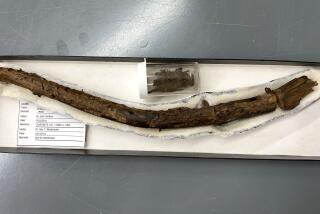STYLE: GARDENS : The Plants That Time Forgot
- Share via
Cycads have been around since dinosaurs first crawled out of prehistoric swamps. But while the giant lizards remain the darlings of popular culture, the spiky plants that survived them have languished in obscurity. Among their few supporters is Loran Whitelock, a botanist who has spent three decades making scores of cycads feel at home in his hillside garden in Eagle Rock. Passionate about these cone-bearing greens--which resemble splayed, upright feather dusters--he’s wandered the world collecting them, along with the palms, ferns and euphorbias they often grow with in the wild.
So monumental and weird is the serpentine forest Whitelock has created from plants normally seen, if at all, in ones and twos, that walking through it is like traveling back in time to Jurassic days. Legions of cycads--from the common Japanese native known as the sago palm, to the rare Encephalartos woodii , extinct for a century in its South African habitat--fan out along a brick path, cradling cones in their topmost fronds. Nearby, Australian staghorn ferns ruffle the trunks of Chinese, Mexican and Brazilian palms, dragon trees ( Dracaena draco ) lift their spiny heads against the sky, and Spanish moss hangs like mist from bare limbs.
In 1964, when Whitelock first went cycad-hunting in South Africa, there was little known about these tropical primitives. They grew in jungles and rain forest inaccessible to all but the most determined seekers. Since then, civilization has swept in, habitats have been destroyed and cycads are now internationally recognized as endangered. Whitelock, who propagates cycads partly to save them from extinction, has developed one of the best collections in the country. He has also written a comprehensive text on cycads of the world, which will be published next year by Timber Press.
Will cycads, squeezed by overpopulation, ever go the way of the dinosaurs? Possibly. But, says Whitelock: “They’re tough plants, survivors. If the human race disappeared overnight, they’d grow and prosper.”






